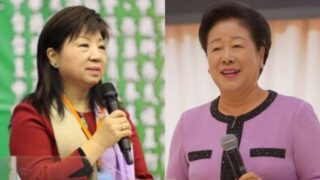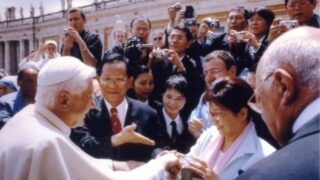Controversies in the Catholic Church about tolerance and religious liberty may offer some guidance for the situation in Taiwan.
by PierLuigi Zoccatelli*
*A paper presented at the webinar “Tolerance for Tai Ji Men,” co-organized by CESNUR and Human Rights Without Frontiers on November 16, 2022, United Nations International Day of Tolerance.


Catholic scholars of my generation lived through interesting times for the notions of tolerance and religious liberty and their interpretation by the Catholic Church. They have been times of great controversy.
To make a longer history short, in the 19th century, confronted with the ideology of secularism, the Catholic Church, particularly through Pope Leo XIII, connected religious liberty with the truth. Properly speaking, religious liberty was a right inherent to the truth. Because Catholicism was true, it had the right to be propagated freely. This, however, did not mean that minority religions in countries with a Catholic majority should be persecuted. While they did not have a right to religious freedom, it was appropriate to grant them tolerance, i.e., the possibility of operating freely as long as they respected the laws of the land.
With 21st-century criteria, this position amounted to promoting discrimination. However, it is always a mistake to judge the past with the criteria of the present. In the 19th century, tolerance was already a progress with respect to intolerance. In several countries, religious minorities were not tolerated at all; and the Pope was certainly aware that Catholics had just won tolerance in countries such as the United Kingdom and Denmark, where they had been persecuted for centuries.
There was another reason Pope Leo was cautious about religious liberty. He had his eyes on the situation in France, where religious liberty was connected with a doctrine of religious relativism, claiming that all religions are equally true—or equally false. It is because the Catholic Church refused to accept the official relativism that it was persecuted by secularist governments in France.


In the following century, at the Second Vatican Council (in fact, as a result of a process that had started decades before), the Council fathers realized that there was a different model of religious liberty, one not connected with relativism and embodied in the Constitution of the United States. This model did not take a stand on questions of truth and falsehood. It defined religious liberty as an immunity from the state, prohibiting the secular authorities from interfering in the citizens’ religious choices.
It was an American Jesuit priest, Father John Courtney Murray, who drafted the declaration “Dignitatis Humanae,” adopted on December 7, 1965, by the Second Vatican Council, by which the Catholic Church formally accepted the principle of religious liberty.


Problems arose after the Council, as some liberals claimed that with the declaration the Catholic Church had embraced modern relativism, while some conservatives objected that the Council had repudiated the teachings of Leo XIII and even its commitment to the truth.
Cardinal Joseph Ratzinger, who became Pope Benedict XVI in 2005 and retired in 2013, is the author of several fundamental texts on the issue. He claimed that the documents of Vatican II should not be interpreted through a “hermeneutic of discontinuity and rupture” with respect to previous Catholic teachings, but through a “hermeneutic of reform in the continuity.”
Examining “Dignitatis Humanae,” he found the continuity in the fact that the Church still maintains that relativism is wrong. In a speech of 2010, he explained that the Catholic Church has not embraced the French but the American model of religious liberty. It maintains that an objective truth exists, and human beings have a moral duty to seek it. Religious liberty means that this quest for truth should develop freely, without undue interferences by the states.
You would have noticed that these more recent Catholic texts speak of “religious liberty”—not of “tolerance.” Yet, tolerance is still mentioned in international and regional treaties. Tolerance is the first step in a path leading to religious liberty. Without tolerance there cannot be religious liberty, although religious liberty is a broader concept than tolerance. We should ask that mature democracies implement religious liberty, but for some intolerant regimes introducing tolerance would be a welcome first step.
As scholars have explained, Imperial China did not have a tradition of religious liberty, and Emperors decided what religions were free to operate or persecuted. This explains the problems of Communist China, Nationalist China, and Taiwan in accepting a comprehensive notion of religious liberty.
One may believe that after the Martial Law period Taiwan has joined the ranks of the countries affirming religious liberty. This is true on paper, but the Tai Ji Men case proves it is not always the case in practice. Precisely the Tai Ji Men case proves the necessary link between religious tolerance and religious liberty.


Tolerance is a state of mind and a cultural climate. Religious and spiritual minorities should not be slandered by the media or mistreated by bureaucrats. What happened to Tai Ji Men demonstrated that Taiwan suffers from a systemic deficit of tolerance, which risks making the official proclamations of religious liberty empty. It is only when all the components of the Taiwanese state will show a full tolerance to Tai Ji Men that the doors to a full-fledged religious liberty will start to open.









